Update 3/27/23 (Original article begins below) — Seabird Owner Sudhir Govind said the $1.8 million is a starting bid as reported, but the motel will not sell for that price. There is an undisclosed reserve bid and the property will not sell for less than that amount. He said the low starting bid may have created the impression it was being sold under duress.
He said the sale is not under duress nor is there any lack of money to pay staff. He said if the reserve bid is not met, he will simply move on and run the motel as he has been doing.
“The busy season is coming up.” Govind said he renovated many of the rooms since buying it during the pandemic to fix it up some and to make a profit. He said that is still the plan. He said he moved up to the area to do that. but has now moved on from the project and is back in the Bay Area.
He said the fact the auction was featured so prominently in the article may have given a different impression from the reality, which he termed more like an open house sale than the typical real estate auction. Govind said the low amount of the starting bid, without the information that a reserve price existed, was the main issue. (A reserve price must be reached before the auction can be final).
FORT BRAGG, 3/26/23 — Mendocino Coast motels have been changing hands since the pandemic at an unprecedented pace, a review of county files shows. Numerous lower and higher priced hotels and inns have sold recently in Fort Bragg, Mendocino, Little River and Albion.
But none of those hospitality properties were purchased with “free” money provided by California Gov. Gavin Newsom’s Homekey, which has been buying motels all over the state to convert to permanent supported housing for the homeless.
On April 3, the 65-room Seabird Lodge will be on the auction block, a rare opportunity in rural Northern California real estate. The realtor in charge of the sale, which requires a $1.8 minimum bid, says there will be no delays in the sale. The motel would seem to fit the criteria for Homekey and sits close to social and medical services.
Will the city bid this time?
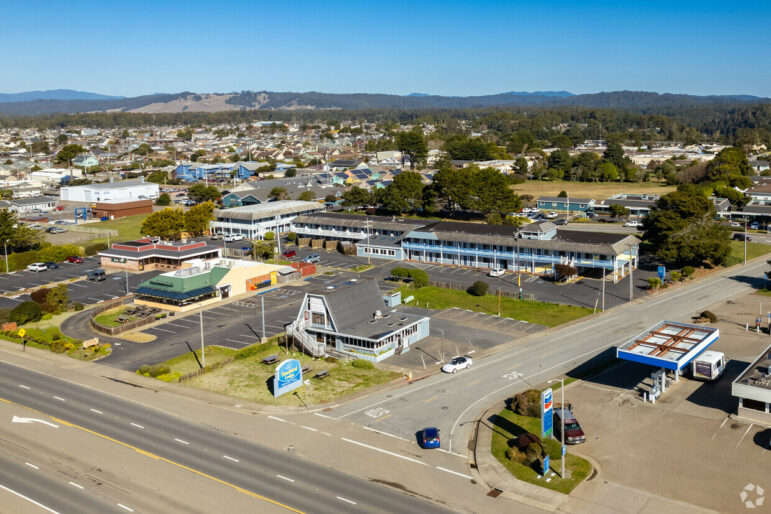
Fort Bragg Mayor Bernie Norvell, who has been leading efforts to deal with the homeless issue in Fort Bragg, says the city isn’t interested in Homekey. That was true even when Mendocino County offered to lead the effort to buy two low-end Fort Bragg motels. Norvell says the city needs more motel rooms, not fewer, and would be hit hard by the loss of sales tax monies due to Homekey.
“The ‘feel good’ side of project Homekey is that it provides housing. Tough to argue against that, but it also changes the look of your community and in our situation, the downtown,” said Norvell in an interview.
The city council put its focus on building The Plateau, which includes 20 units for the formerly homeless and is now focusing on developing workforce housing through its new community land trust, called “Housing Mendocino Coast.”
“My goal is to make sure The Plateau is successful and supported by the community so perhaps we could do more of that. It’s a great design and fits well into our community, while providing needed housing,” Norvell said.
“The city has passed on Homekey money for a few reasons. All of the hotels are on Main Street and contribute to our general fund and provide much needed rooms for our tourist industry,” he said.
Many of the lower-end motels have had high vacancy rates in the off season, even as year-round tourism grows in Fort Bragg, transfer occupancy tax records show. Mendocino Coast motels once made the vast majority of their income in the warm six months of the year, but now that differential is far less dramatic. Records from one large hotel showed a 75-25 split in 2007 but less than 60 percent of the revenue during the summer of 2019. While hotel occupancy rates fell off the charts in 2020, it bounced back surprisingly quickly, and revenue was up in 2022, even over 2019, TOT records show.
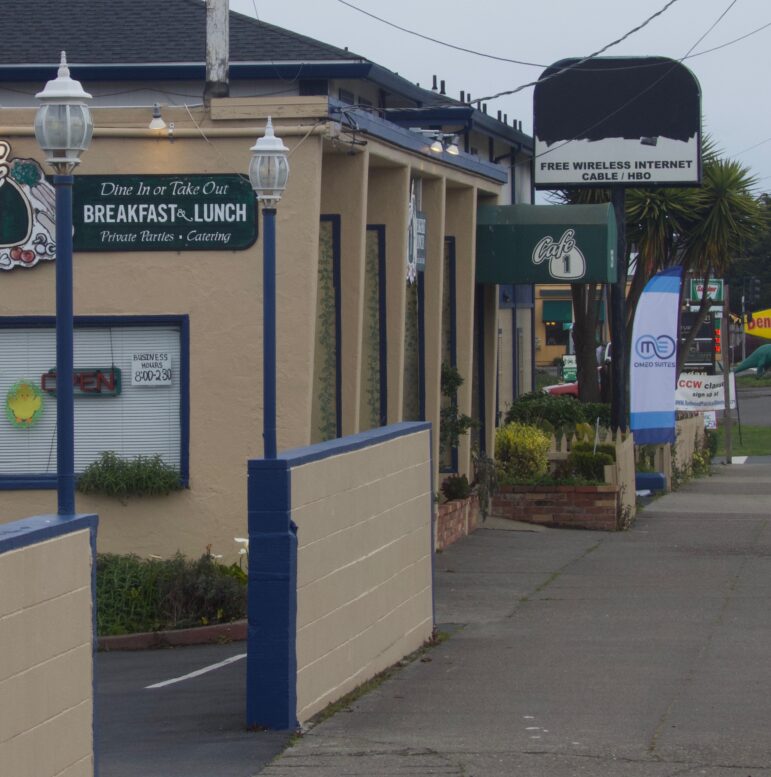
The state has allocated $2.5 billion to Homekey, with a second round finishing up this spring. A third round of $750 million will be released this week, said Alicia Murillo, spokesperson for Homekey for the state. Learn more about Homekey round 1 here and round 2 here.
Homekey 3.0 is said to address issues raised by local governments and developers, the biggest of which has been insufficient funds needed to maintain the projects after they have been built and rented. Also, there is a continuing challenge to keep rents to the low levels required. Murillo said she could not comment on what could be in the new program until it is released. Because most of the money is federal, there are also requirements like no smoking, that have proven so unpopular that many have ignored the offerings or moved out. The city of Fort Bragg was a participant in Project Roomkey, which early in the pandemic paid for motel rooms for the homeless to use. Newsom then converted that to Homekey, using federal stimulus money.
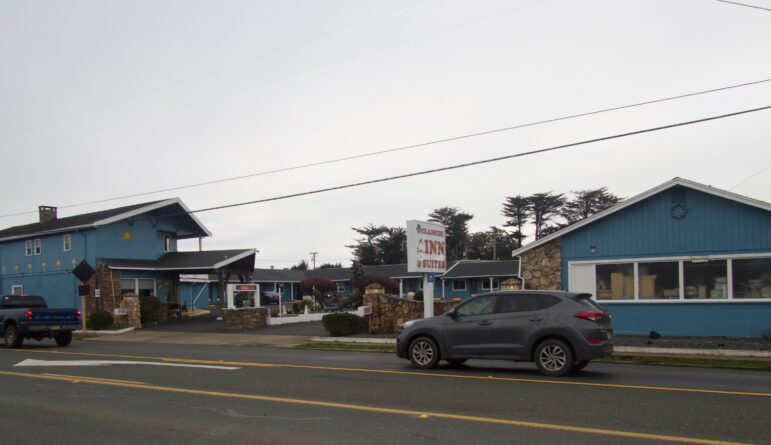
“It would be a step backwards in my opinion to convert our hotels into housing. In my opinion we cannot, and should not, try to take on either the counties’ or the states’ homeless problems nor fall into the trap of alluring monies,“ Norvell said.
Defenders of Homekey say the project is for communities where the homeless population is growing fast. Indeed California overall has seen huge increases in the homeless. But Fort Bragg has seen a decline in homelessness, which began even before the pandemic. Would it attract homeless people to a coastal city with good services?
“I have not heard of Homekey projects serving people from outside their regions. In talking with Homekey operators in rural areas, I’ve mostly heard that the projects fill an unmet need in their local community, like places where Homekey provides the first or only emergency shelter within 15 or 20 miles. Also, Homekey projects providing permanent housing must take residents from the Coordinated Entry Systems (priority lists of people for housing assistance), which are regionally specific,” social scientist Ryan Finnigan, who authored a published study on Homekey, said. Fort Bragg has a year-round shelter in the Hospitality Center and a winter emergency overflow center.
Newsom has been traveling around the state in recent days, on the stump to urge local cities and counties to overcome decades-long objections to new affordable housing. Newsom wants local governments to reduce homelessness by 15 percent by 2025, but all the city and county plans now on the books would only accomplish less than a third of the governor’s goal. Newsom is buying tiny houses and shipping them to the big cities hardest hit by homelessness and plans to expand that program.
Fort Bragg may not be interested in Homekey, but the city has been impacted by Newsom’s efforts to get more housing. A recent visit to city hall revealed a property owner being told by city staff that a second unit long disallowed by setbacks now must be considered, because of the Newsom administration’s pressures to make cities and counties stop saying no to new housing.
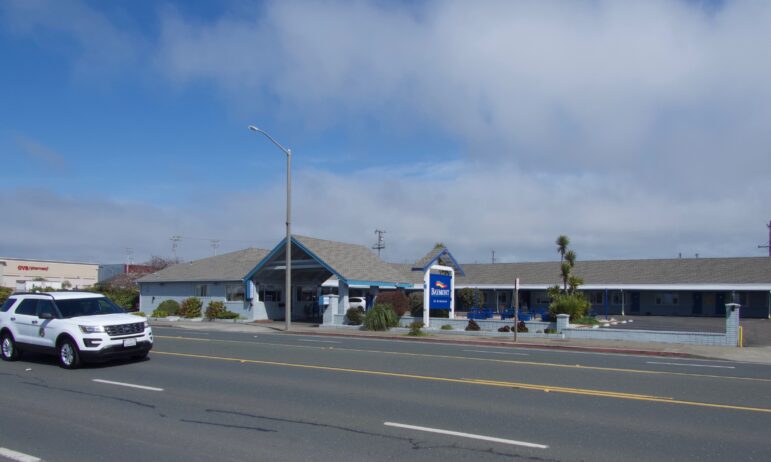
The County of Mendocino and two local tribes are among those to have used the first two rounds of Homekey. Mendocino County got more than $10 million to convert a Ukiah motel into housing for the homeless. The rooms have proven too small for many people, and two families from the Homekey project were moved into the Plateau. Homekey’s first round boasted 8264 individuals housed, 6050 “doors” converted, 5911 units created on 120 different project sites. The second round is not yet finished. The county selected two motels at the bottom in Fort Bragg and wanted to partner with the city. Instead, they ended up partnering with Ukiah.
Norvell explained the city’s reluctance to partner for Homekey. “I’d like to use the old Ebb Tide Lodge and the Oceanside (Suites) as examples. I believe these were two of the hotels the county wanted to purchase for housing. We said ‘no thank you’. [Then] a private investor bought both motels and remodeled them, upgrading them considerably. This increased their room rate three-fold thus increasing the city’s transfer occupancy tax by the same amount.”
A search of county records showed both hotels had changed hands in the last two years, and both have been repainted, renamed and spruced-up since the pandemic. The Oceanside Inn & Suites sold for $3.1 million to Glass Beach Estates, a company based in Los Gatos, county records show. Located on the north end of Fort Bragg, the name is now “The Oceanside Inn & Suites, a Days Inn by Wyndham.”. Wyndham is a fast growing motel conglomerate, having gobbled up dozens of well known hospitality chains. Its 22 brands include Ramada Inn, La Quinta, Days Inn, Travelodge, Super 8 and Howard Johnson. Increasingly, mom and pop motels or even smaller chains are having trouble competing in a booking world controlled by a small group of online brokers, hospitality industry publications report.
Across the street from the Oceanside, the Travelodge by Wyndham has just changed hands, with no information yet available on the buyer or seller or price. The name has been blacked out on the lighted sign with paint. The new owners/managers have not yet responded to a request for an interview by The Mendocino Voice. Omeo Suites has put up its signs at the motel. That appears to be a small motel chain out of Southern California.
The state reported that the average state-level expenditure per Homekey unit was $123,987, supplemented by an average local match of $23,987 per unit, for an average total cost per unit of $147,974. With record high building material costs during 2020 and 2021 taken into account, this cost is less than half of building new housing, even on owned land.
“As far as handling the issue of homelessness, I support strategies the mayor and council have adopted over the last few years,” said Vice Mayor Jason Goedeke, who was elected in November.
“As a general thing Fort Bragg needs its hotels,” said Godeke. “The city government benefits from income generated by the transient occupancy tax, and our city’s economy is supported by visitors, who need places to stay. It’s not to say that the hotel-conversion model might not be appropriate in some communities. I just don’t see it as the best strategy for a relatively isolated town with a robust tourist economy and limited service capacity.”
One of Homekey’s big success stories the backers boast of has been in Crescent City in Del Norte County, one of the poorest counties and communities in the state. In October 2020, the state awarded Del Norte County $2.4 million to buy a 30-room motel and turn it into affordable housing
“We’ve spent hundreds of thousands of dollars on homelessness. I put a chart together by year of how much money we’ve spent, and how you have to look at the big picture. Yes, you might be losing some transient occupancy tax, but you’re saving money and helping to solve homelessness,” Heather Snow, Del Norte County Health and Human Services Department Director, told the authors of the UC Berkeley Terner Center study on Homekey.
“I’ve talked to Homekey operators that have weighed the estimated loss of TOT revenue against estimates of savings for emergency services due to Homekey. Research has repeatedly shown that housing interventions ultimately save public money because they’re less expensive than the emergency services (ambulances, emergency rooms, police, fire, etc.) that are otherwise used when people are unsheltered,’ said Ryan Finnigan, a social scientist who is one of the authors of the Berkeley study.
Fort Bragg’s preferred effort in housing is Housing Mendocino Coast, a community land trust that is just getting started. The plan is to buy land and develop it in such a way that it remains affordable for decades to come. People in the workforce could buy in at a rate they can afford at their salary, with grants covering the difference between that and market rates. They could build equity in the home and take that with them into the housing market. The granted funds would be repaid, and the next buyer could also buy in at a lower rate.
“If you talk to the hotel industry, they will tell you, as they have told me, that we are actually in need of more rooms, not less. As elected officials, we have to look out for the entire community and the taxpayers when making these kinds of decisions. The community land trust focuses on true workforce housing, not low income,” Norvell said. He noted that if the city were to lose revenue from these motels, many other important efforts would suffer. “Things like events, field improvements, tennis and pickleball courts, Bainbridge Park and continuing to give cost of living increases to employees. These just to name a few,” he finished,
Councilmember Marcia Rafanan, who has been directly involved with working on solving the homeless problem even before she was elected to the City Council, agrees with the direction Norvell has taken.
“Mayor Norvell and Police Chief (Neil) Servenka have been doing an excellent job with the homeless. The Plateau has housing for low-income people and people from the streets who receive life skill trainings that have been forgotten from living on the streets for so long,” she said.
The city, county and schools all have been getting a bump from the flurry of hotel sales. Each sale has or will soon cause the property taxes collected from the property to rise dramatically. Under Proposition 13, commercial properties are treated differently than residential but the basic tax is based on the most recent sale. In Fort Bragg, some of those base sales go back decades. In the case of the Colombi Motel, which recently sold to Chico developer Ryan McDougal, the property had never been sold since being built by the Colombi family in the 1950s.That property includes not just kitchens in most units but also comfy carports. It is being remodeled into the Abalone Apartments, which will offer market rate housing.
“If low-income homeless housing is all we do, then that will be all we are,” Norvell said.
“We are a tourist destination, like it or not. We are neither the county seat nor on the 101 corridor so turning hotels into housing does not help the city of Fort Bragg as much as it would harm us. “
Homekey both rejected and welcomed in rural California
More cities have declined to participate in Homekey than have used it. The state’s biggest cities have been big players. Fresno County has also been a big area for Homekey, but some agencies there are now backing out on doing more because of the lack of funds for ongoing operations and maintenance of older and expensive to manage properties.
Finnigan rejected the notion that Homekey is overbalanced to the cities.
“From my look at the data, Homekey is actually being used quite a bit in rural areas. When comparing a) the number of awarded Homekey projects and the numbers of units they’ll include, and b) the level of unsheltered homelessness from the point-in-time counts, Homekey has the potential to shelter or house about the same percentage of unsheltered people in rural areas and major cities,” Finnigan said.
Murillo said all the governments in Mendocino County who applied in the first two rounds of Homekey won awards. The state data is not separated by county and is difficult to access. In addition to the county project that converted 56 motel rooms to units, the project funded The Hopland Fourplex for the Northern Circle Indian Housing Authority and 15 more permanent units for the Guidiville Indian Rancheria of Ukiah.
Neither Willits nor Point Arena has been interested in Homekey, despite many economy motels in Willits and Ukiah. There are no motels or hotel properties for sale or auction in Willits, Ukiah or Point Arena on Loopnet or any other site this reporter could find.
Cheap hotels, attractive but have drawbacks
Cheap hotels have always been the first choice, but that often hasn’t worked out. A number of cities—including Los Angeles and San Luis Obispo—were able to acquire Motel 6 properties. However, rooms in these properties tended to be on the smaller side (170–250 square feet), making it difficult to add a kitchenette and abide by PSH unit standards, Leepi Shimkhada, Senior Director of Housing and Services for the Los Angeles County told the authors of the Berkeley study.
Many tribes have seized on Homekey to house homeless members. The Scotts Valley Band of Pomo Indians won a Homekey grant to create the Sugar Bowl apartments in Lake County. In Sonoma County, the Kashia Band of Pomo Indians are converting a Santa Rosa motel into 19 apartments for people who are chronically homeless. And in Humboldt County, the Yurok Tribe was awarded $2.2 million to purchase a Eureka motel and turn it into 18 units of permanent supportive housing.
“One benefit we described in our report is that in addition to providing more shelter and housing units, Homekey projects can help create stronger partnerships between local homelessness agencies. Those partnerships can have downstream benefits, like when a service provider and housing authority are able to work more closely to connect people to housing assistance even outside the specific Homekey project,” Finnigan said.
Fort Bragg’s Super 8 Motel is also currently listed for sale on Loopnet.
How to bid on the Seabird Lodge, which is located at 191 South Street.
Matthews Real Estate Investment Services is the seller of the property and says in its ads for the Seabird that Fort Bragg and points north (like Eureka) are unique investor experiences in having lower end motels.
“Economic lodging dominates the California Rural North submarket, with more than two-thirds of the rooms being Economy or Midscale – a concentration that only exists in about 5% of US submarkets,”
The advertisement said revenue per room is up 30.5 percent nationally, making these type hotels a great investment in an uncertain market.
(This is part 2 in a series about the homeless. The Mendocino Voice will look at homeless numbers and counting in another story. A fourth will look at the non profits like Hospitality Center and houses of faith and their role in homeless services, as well as the controversy between the official mandate of Housing First and Robert Marbut’s “Housing Fourth”?)

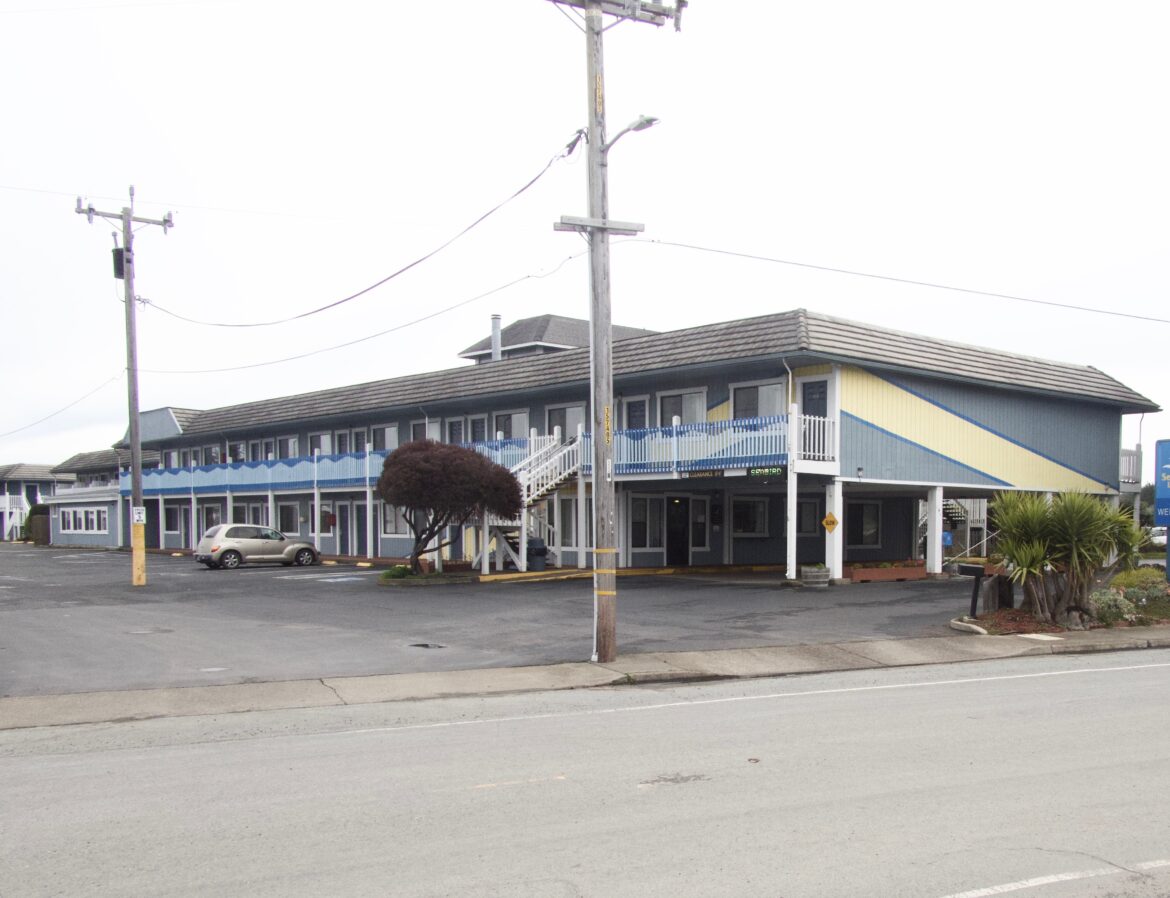



In any discussion on housing the homeless and providing workforce housing, you failed to discuss the assault on our local housing being converted to vacation rentals. We are under assault by VBRO, Blue Door and Vacasa, just to name a few, which is leading investors to purchase prime and not so prime residential properties while displacing working families and driving up real estate prices, out pricing local families. Try to build a new hotel on the coast and the NIMBY’s jump out of the woodwork, but nothing is said about the hundreds of single family homes being converted to vacation rentals. The City of Fort Bragg has acted to literally ban vacation rentals of single family homes and apartments, but the County, including 5th district Supervisor Dan Williams, could care less about protecting housing for the working families. Let the 5th district take on the role of low income housing and housing the homeless, we in Fort Bragg have done more than our fair share. In fact, in the last 20+ years, the only major projects have been low income projects while ignoring the demand for affordable housing for working families.
Correction:
Converting a hotel to house the homeless is not a step backwards. It is a moral responsibility. Why are housing tourists more important than housing the homeless? Having one hotel to house the less fortunate will not burden or bust our economy here.
There are homeless residents living in their cars and some rotating at camp grounds who hold jobs on the Coast that service our tourist industry. I met some of them when I was recently running for Ft. Bragg City Council. I challenge the current Ft. Bragg City Council to have some heart, step up, do the right thing and take advantage of California Gov. Gavin Newsom’s Homekey funding and purchase a hotel to provide critically needed housing.
Several studies indicate that a homeless person costs approximately $30,000-$50,000 per year in supportive services. Two years of that is enough to pay for an entire home in some cities. There are about 500,000 homeless individuals in the U.S. The price tag to treat the malady of homelessness works out to at least $15 billion per year.( https://www.streetsensemedia.org/article/ending-homelessness-would-cost-far-less-than-treating-it/)
In 2018, California spent nearly $65 million; in 2019, it spent over $133 million; in 2020, it spent over $191 million. The report was produced by the state’s Interagency Council on Homelessness and presented to the Legislature in February.
“Cost efficiency is an important measurement of the effectiveness of homeless services. Service providers and agencies must work to spend the least amount of public and private dollars possible to make the greatest impact, while also saving money through decreasing the use of emergency and justice services. Whether a person is chronically homeless or not, studies consistently show that people experiencing homelessness are associated with greater emergency room use, greater inpatient admissions, and longer hospital stays than their housed counterparts” (see https://my.neighbor.org/what-is-the-cost-of-homelessness/)
For these reasons, we should all be asking the question: What is the real cost of homelessness in our communities?
The City of Ft. Bragg still has not adequately stepped up to house the homeless 24/7.
The DANCO project that the City Council and staff have been working on since 2018 and now completed only houses a small percentage. A $17,000 grant offered by the Mendocino County Continuum of Care has made it possible for the city to buy a Greyhound bus ticket for anyone who needs a ride home. We have an approved Crisis Respite Center and a mobile outreach service. However this does not solve the lack of housing here in Ft. Bragg. There is no supportive additional facility or services to help house the homeless – individuals and families – other than the recently built DANCO project, The Plateau on South Street.
Several times the idea was brought up of purchasing a motel or hotel. This idea was killed.
Such a Project using Home Key funding would not harm the city’s tourism economy. Other cities large and small have undertaken such projects and it has been a win for all.
In 2018 the city of Fort Bragg and Danco, a nonprofit affordable housing developer, were working on The Plateau, a sixty-eight-unit affordable housing project.
SEE: Housing Element 2019 (Fort Bragg) Prepared by: Community Development Department Director Marie Jones and Staff Member Sarah McCormick https://www.hcd.ca.gov/housing-elements/docs/fort-bragg-6th-adopted092419.pdf
In 2020 On Nov. 1, the City Council directed staff to submit a grant application for $3 million to the state Continuum of Care for Homeless Emergency Aid Program funding for the permanent supportive housing component of the project. In December, the Continuum of Care awarded the full requested amount for construction of 20 permanent supportive housing units at the South Street location.
This was under the administration of Mayor Lee and City Manager Tabatha Miller. The city worked with DANCO to secure financing:
https://www.city.fortbragg.com/home/showpublisheddocument/2066/637720193437100000
Because The Plateau is an all-electric and affordable housing development. It was awarded $345,000 in incentives—$5,000 per home—through the Advanced Energy Build program offered by Sonoma Clean Power, the public electricity provider for Mendocino County and the development.
In 2019 the Ft. Bragg City Council passed a Resolution Approving and Authorizing the Execution Of An
Affordable Housing Loan Agreement with Fort Bragg South Street Lp For The Plateau Project https://cityfortbragg.legistar.com/View.ashx?M=F&ID=8806651&GUID=B2955FAE-85F6-49A8-B340-2DA1DA94007D
The Plateau also qualified for $3 million in state grant funding for 20 permanent housing units with support services for residents facing homelessness. In addition, it received federal and state tax credits, city and county Homeless Emergency Aid Program grants, and other funding available to affordable and all-electric housing developments. Pacific Western Bank provided construction and permanent financing through its Community Benefits Program.
https://www.treasurer.ca.gov/cdlac/meeting/2020/20200414/staff/8.34.pdfMore can be done!